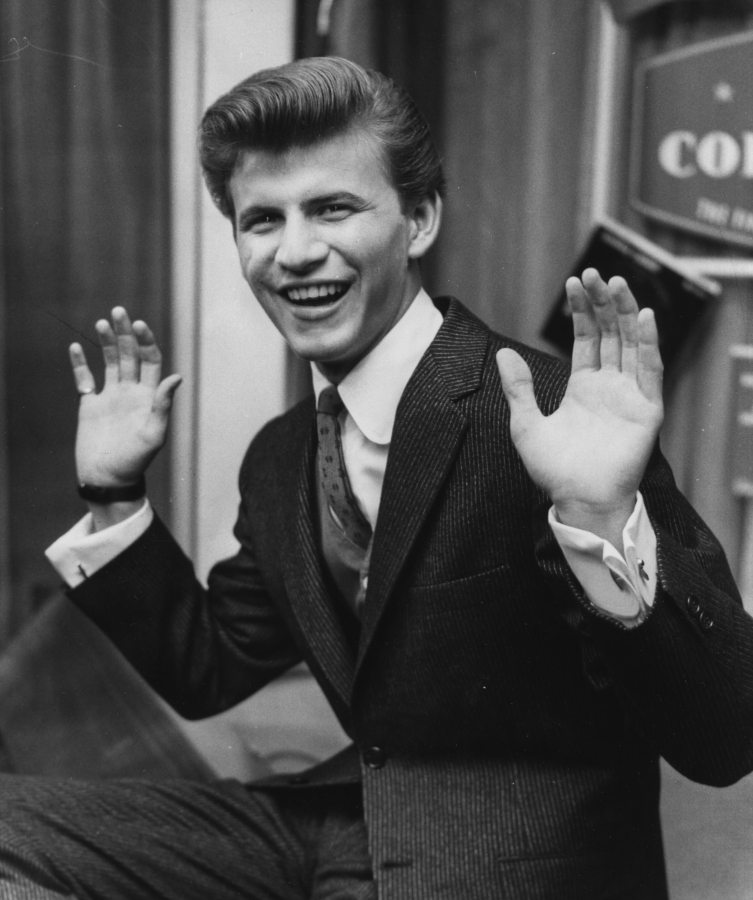PHILADELPHIA — Bobby Rydell, the singer who rose to fame as a South Philly teen idol with hits like “Kissin’ Time,” “Wild One” and “Wildwood Days” and maintained a career in show business that lasted six decades, has died at age 79.
Rydell’s death was confirmed by his marketing and event coordinator Maria Novey, who said he died Tuesday afternoon at Thomas Jefferson Hospital in Philadelphia.
She said that Rydell’s death was unexpected, though he had many health problems, dating back to when he underwent a double transplant to replace a liver and a kidney in 2012.
Philadelphia DJ Jerry Blavat had booked Rydell to perform at the Kimmel Center in January but the singer was unable to perform due to poor health. Blavat said the cause of death was pneumonia, and that Rydell’s wife Linda Hoffman was by his side at Jefferson Hospital.
Along with Frankie Avalon, Chubby Checker and Fabian Forte, Rydell was one of four South Philly teen idols who found a national audience in the late 1950s and early 1960s through Dick Clark’s Philadelphia based television show “American Bandstand.”
Born Robert Ridarelli, he won a talent contest on Paul Whiteman’s “TV Teen Club” show in 1950 and soon after changed his stage name to Rydell. Before he was out of his teens, he was an international star, touring Australia with the Everly Brothers in 1960 and becoming the youngest performer to ever headline the Copacabana in New York in 1961.
His hits were many: “We Got Love,” was his first million seller, and “Little Bitty Girl” his second. In 1960, he hit big with a cover version of Dominic Modugno’s “Volare,” and “Wildwood Days,” in 1963, became a song of celebration and nostalgia for generations of Philadelphia area Jersey Shore goers.
That same year, he starred opposite Ann-Margret and Dick Van Dyke in the film version of the musical “Bye Bye Birdie.” His name was so associated with the pre-British Invasion period of vintage rock and roll that the school in the 1971 musical and 1978 film “Grease” was known as Rydell High.
Of all the teen idol singers, “he had the best pipes,” Blavat said Tuesday. “He could do Sinatra, he could do anything. Listen to “Volare.” He could do comedy. He played the drums. He was a great mimic. He was on “The Red Skelton Show” many times. He could have been as big as Bobby Darin, but he didn’t want to leave Philadelphia.”
Rydell’s father, Adrio, began taking him to entertainment venues in South Philadelphia like The RDA Club and Erie Social Club when he was 7 years old, asking if his talented son could sit in play drums with the house band.
He started out as a crooner in his early teens, before becoming a rock ‘n’ roll sensation who along with Avalon, Fabian and Checker, helped fill the void for pompadoured teen hearth throbs when Elvis Presley’s career was put on hold when he went in the Army in 1958.
“I was not really a rock-and-roll singer,” Rydell told The Philadelphia Inquirer in 2016, at the time of the publication of his memoir “Bobby Rydell: Teen Idol On The Rocks.” “That’s what you had to do to make it. I’m an American Songbook guy.”
If asked for the favorite song in his repertoire, Rydell would respond without hesitation. It was “Wildwood Days,” the ode to the beach town where, when he was growing up in a row house on 11th Street in South Philly, his grandmother ran a boardinghouse he could escape to. “It’s the national anthem of the Jersey Shore,” he said.
When Rydell’s career took off in 1961, his father resigned from his job as a foreman for the Electro-Nite Carbon Company to become his road manager. A few years later, Rydell moved his parents and his grandparents into a house with him in Penn Valley, where he lived until moving to Blue Bell in 2019.




